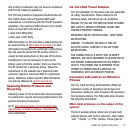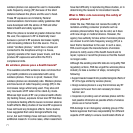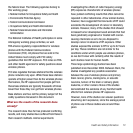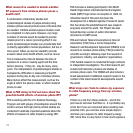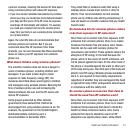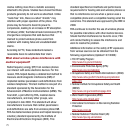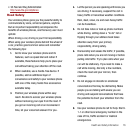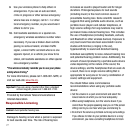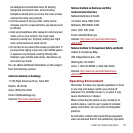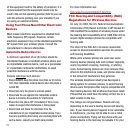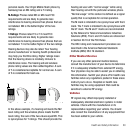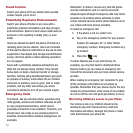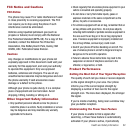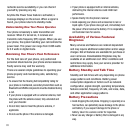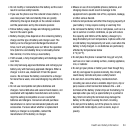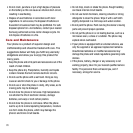
Health and Safety Information 78
out background environmental noise. By blocking
background environment noise, noise cancelling
headphones should allow you to hear the music at lower
volumes than when using earbuds.
•
Limit the amount of time you listen. As the volume
increases, less time is required before you hearing could
be affected.
•
Avoid using headphones after exposure to extremely loud
noises, such as rock concerts, that might cause
temporary hearing loss. Temporary hearing loss might
cause unsafe volumes to sound normal.
•
Do not listen at any volume that causes you discomfort. If
you experience ringing in your ears, hear muffled speech
or experience any temporary hearing difficulty after
listening to your portable audio device, discontinue use
and consult your doctor.
You can obtain additional information on this subject
from the following sources:
Operating Environment
Remember to follow any special regulations in force
in any area and always switch your phone off
whenever it is forbidden to use it, or when it may
cause interference or danger.
When connecting the phone or any accessory to
another device, read its user's guide for detailed
safety instructions. Do not connect incompatible
products.
As with other mobile radio transmitting equipment,
users are advised that for the satisfactory operation
American Academy of Audiology
11730 Plaza American Drive, Suite 300
Reston, VA 20190
Voice: (800) 222-2336
Email: info@audiology.org
Internet:
http://www.audiology.org
National Institute on Deafness and Other
Communication Disorders
National Institutes of Health
31 Center Drive, MSC 2320
Bethesda, MD 20892-2320
Voice: (301) 496-7243
Email: nidcdinfo@nih.gov
Internet:
http://www.cdc.gov/niosh/topics/noise/
default.html
National Institute for Occupational Safety and Health
Hubert H. Humphrey Bldg.
200 Independence Ave., SW
Washington, DC 20201
Voice: 1-800-35-NIOSH (1-800-356-4647)
Internet:
http://www.cdc.gov/niosh/topics/noise/
default.html



